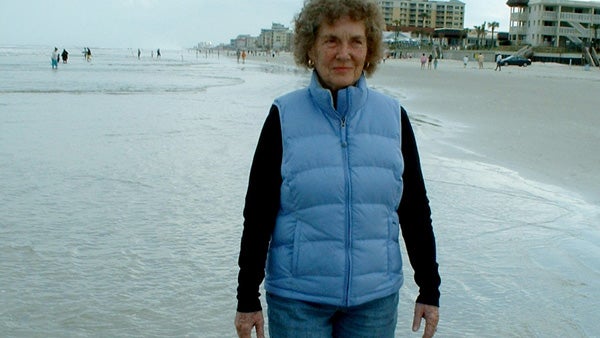Guardianship cases can turn into nightmares for wards and their families

Rita Denmark
Maybe you know an older person suffering from Alzheimer’s or an adult who is intellectually disabled. In the best cases, a family member or friend will agree to care for people in these vulnerable situations. But when family conflicts come into play, the case can go to what’s known as guardianship—the courts assign someone to care for that person.
Things can get very ugly very quickly.
Holly Peffer had recently bought a new house in Derrick City, Pa., in 2007, when her life was upended.
“We bought a huge, beautiful, beautiful old home with several acres,” Peffer said. She was preparing to care for her elderly mother, Rita Demark, who was in the early stages of dementia.
“She was physically very, very healthy,” Peffer said. “She walked miles a day. But she had some memory issues. She couldn’t remember what she had for lunch. She loved the outdoors and the four seasons in Pennsylvania. She was born and raised in Pennsylvania and domiciled here her entire life.”
Peffer maintained contact with her sister, who sometimes cared for their mother, though according to Holly, her sister took liberties.
“My sister and my mother are very, very close, and my sister would never physically harm my mother, but as mom’s memory had gotten worse, because my sister was having some financial, many financial difficulties, she was taking more and more and more from my mom,” Peffer recalled. “You know, there were some checks missing, and very obvious forgeries for maybe a couple hundred dollars, there was one for $2,000.”
A worker from the Department of Aging suggested that Peffer apply for guardianship over her mother to keep money from disappearing. That process involves a hearing before a judge. But when the day of the hearing came, Peffer got an urgent call from her mom’s banker.
“She says, ‘Holly, what the hell is going on?’ I said ‘I don’t know, why, what are you talking about?'”
The bank had just received a fax that her power of attorney for her mother had been rescinded. The fax came from Holly’s estranged brother in Florida. Her sister had whisked their mother down south and quickly petitioned so a professional guardian named Jetta Getty would control the mother’s future. Peffer said the Florida court never asked whether Rita Denmark was even a Florida resident.
Since then, Peffer has been waging a battle to try to get her mother back—so far to no avail.
“My husband and I have spent our life savings fighting for my mom,” she said. “We spent every penny we had and every penny I had coming in, but at this late stage, there’s nothing I can do.”
Peffer now devotes much of her time trying to tighten oversight of appointed guardians. She’s a vocal member of the National Association to Stop Guardian Abuse.
Kathleen DiLorenzo from Chester County went through a bitter divorce in 2004. Last year, DiLorenzo’s special needs daughter turned 18—meaning she’d need someone appointed by the court to look after her. She and her ex-husband both applied for guardianship. The court sided with him.
“When there’s competing individuals for guardianship, the court really doesn’t have a standard,” DiLorenzo said. “So, if, in fact, one individual is a drug addict and the other is an alcoholic, the judge is just compelled to select one of them because there are no standards in Pennsylvania as to who would be a better guardian.”
Unlike in a juvenile custody case, DiLorenzo has no right to visit her daughter—and no right to appeal. She hasn’t seen her daughter in months.
“The Common Pleas Court judge admonished my attorney saying, ‘This is not a custody battle, where the best interest is the standard.’ The day she turns 18 and she’s designated as a ward or put under guardianship, she has less rights than prisoners, and I as her mother have no rights to her whatsoever,” DiLorenzo said.
__
This story was first brought to our attention by an investigative report on the website Public Source. To read that report, click here.
WHYY is your source for fact-based, in-depth journalism and information. As a nonprofit organization, we rely on financial support from readers like you. Please give today.

